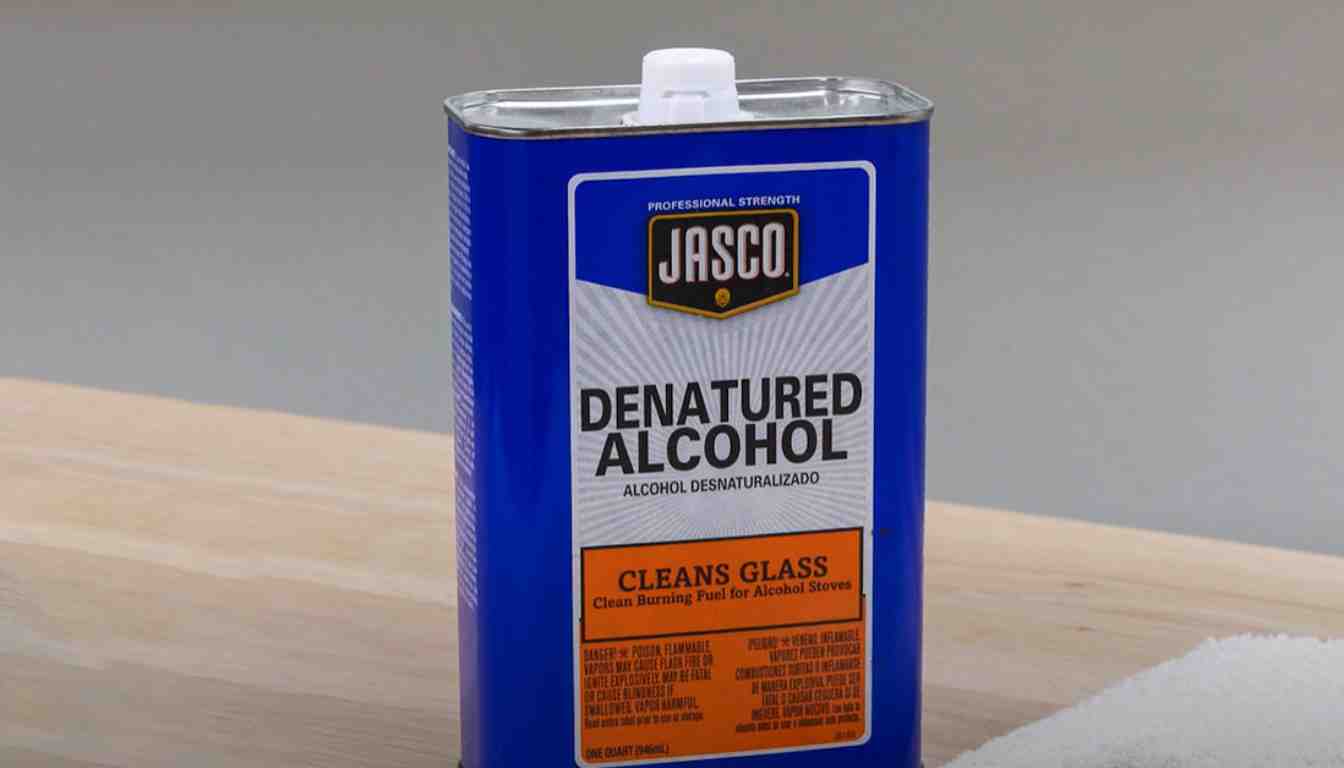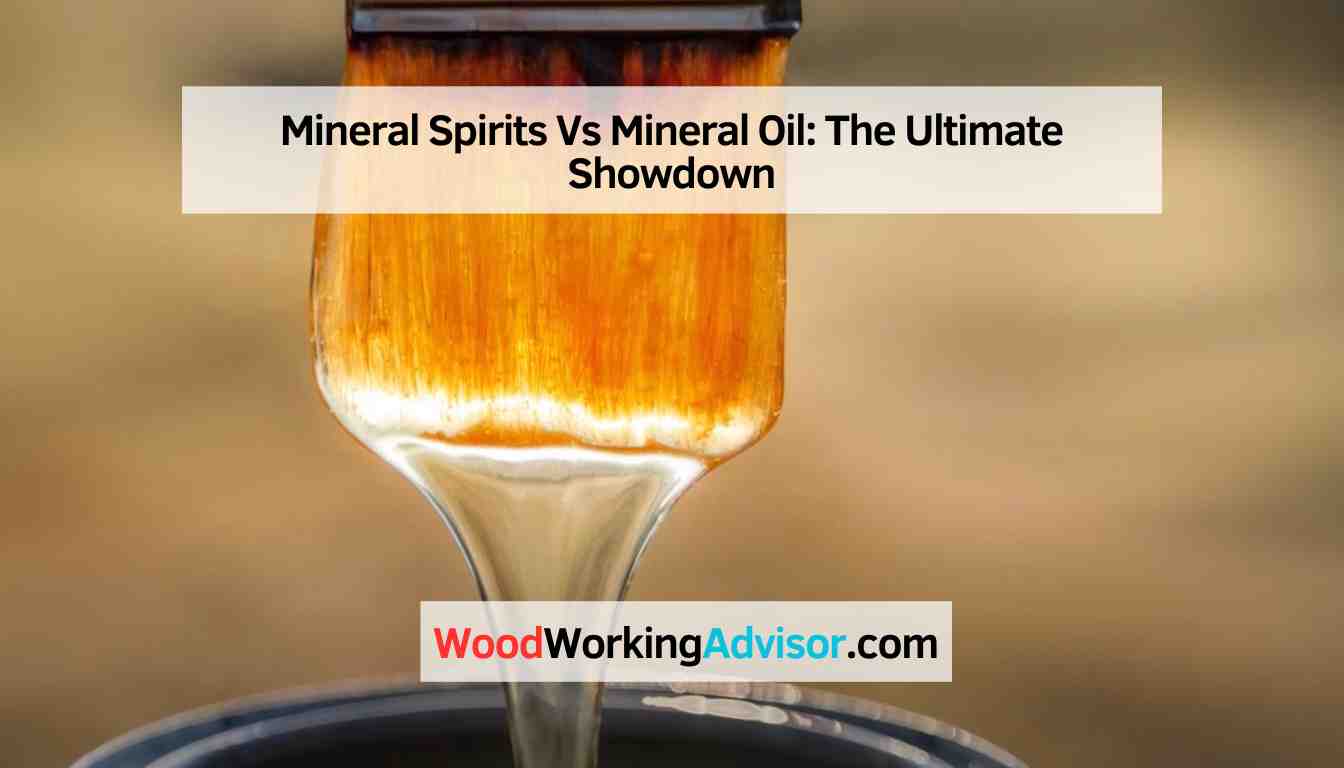Mineral spirits and mineral oil differ in their chemical composition and primary use. Mineral spirits, a petroleum-based solvent, are commonly used as a paint thinner and cleaning agent.
On the other hand, mineral oil, derived from petroleum or mineral sources, is mainly utilized in industries such as lubricants, cosmetics, and pharmaceuticals. These products possess distinct characteristics which make them suitable for specific applications. The comparison between mineral spirits and mineral oil reveals their unique features and applications.
While mineral spirits are widely used as a solvent and cleaner in the paint industry, mineral oil finds its use in areas such as lubrication, cosmetics, and pharmaceuticals. Understanding the differences between these two substances can help determine their appropriate use in various industries. Let’s explore their individual properties and purposes further.
Composition And Properties
Mineral spirits and mineral oil have different compositions and properties. While mineral spirits are a type of solvent used for cleaning and thinning paint, mineral oil is a non-drying oil commonly used in cosmetic, pharmaceutical, and industrial applications. These substances have distinct characteristics and are used for different purposes.
Composition And Properties Of Mineral Spirits
Mineral spirits, also known as white spirit or paint thinner, is a solvent commonly used in various industrial, commercial, and household applications. It is formulated through a distillation process that extracts the lighter components from petroleum. The composition of mineral spirits consists primarily of aliphatic hydrocarbons, with a boiling range between 135-200 degrees Celsius. These hydrocarbons typically fall into the C7 to C12 range, which gives mineral spirits its characteristic properties.
Properties of Mineral Spirits
Here are the notable properties of mineral spirits:
1. Viscosity: Mineral spirits have a low viscosity, meaning it flows easily. This enables it to penetrate surfaces and dissolve various substances effectively.
2. Evaporation Rate: Mineral spirits have a moderate evaporation rate, which allows it to stay on the surface long enough to dissolve contaminants but also evaporate relatively quickly, leaving minimal residue.
3. Solvent Power: One of the key properties of mineral spirits is its excellent solvent power. It can effectively dissolve various types of paints, varnishes, adhesives, and grease.
4. Flammability: Mineral spirits are classified as flammable liquids due to their low flash point. Hence, precautions should be taken for safe handling and storage.
5. Cleanability: Because of its powerful solvent properties, mineral spirits are frequently used as a cleaning agent. It can efficiently remove oil, grease, and dirt from surfaces.

Composition And Properties Of Mineral Oil
Mineral oil, also known as white oil or liquid petroleum, is a colorless and odorless substance derived from petroleum crude oil. It undergoes a refining process to remove impurities and contaminants, resulting in a purified and stable product. The composition of mineral oil consists primarily of complex mixtures of hydrocarbons, ranging from C15 to C50, with a high number of carbon atoms. This composition gives mineral oil its unique properties.
Properties of Mineral Oil
Below are the notable properties of mineral oil:
1. Viscosity: Mineral oil has a relatively high viscosity, making it thicker and less prone to flow. This property is advantageous in certain applications, such as lubrication.
2. Stability: Mineral oil is known for its long shelf life and stability. It has low reactivity with other chemical substances, making it suitable for use in various industrial and cosmetic products.
3. Inertness: The inert nature of mineral oil makes it compatible with a wide range of materials. It does not react with most plastics, elastomers, or metals, making it an ideal choice for lubrication, insulation, and other applications.
4. Insulating Properties: Due to its composition and low electrical conductivity, mineral oil is commonly used as an insulating fluid in electrical transformers and capacitors.
5. Hydrating and Moisturizing: In the cosmetic industry, mineral oil is often used as an ingredient in skincare products due to its hydrating and moisturizing properties. It forms a protective barrier on the skin, preventing moisture loss.
In summary, mineral spirits and mineral oil are both derived from petroleum, but their distinct compositions and properties make them suitable for different applications. Understanding their properties is essential for selecting the right product for specific needs.
Applications
Mineral spirits and mineral oil are two commonly used substances with different applications. Understanding their uses can help you determine when to choose one over the other. In this article, we will explore the common uses of both mineral spirits and mineral oil.
Common Uses Of Mineral Spirits
Mineral spirits, also known as white spirits, is a petroleum-derived solvent commonly used in various industries and for household purposes.
- Paint thinner: Mineral spirits is widely used as a paint thinner, especially for oil-based paints. It helps to dilute the paint and clean brushes or equipment after use.
- Cleaning agent: The strong solvent properties of mineral spirits make it effective for cleaning greasy or oily surfaces, such as metal parts or machinery.
- Degreaser: Mineral spirits is often used as a degreaser to remove oil, grease, and other stubborn stains from surfaces.
- Adhesive solvent: It can be used to dissolve adhesive residues, making it useful for removing labels, stickers, or tapes from surfaces.
- Wood conditioner: Mineral spirits can be used as a wood conditioner before applying varnish or stain to enhance absorption and reduce blotching on the wood surface.
Common Uses Of Mineral Oil
Mineral oil, on the other hand, is a clear and odorless petroleum-based liquid that finds applications in various industries as well as in personal care products.
- Lubricant: Mineral oil’s low friction coefficient makes it suitable as a lubricant for mechanical components, such as bearings, gears, or machinery that require smooth movement.
- Personal care and cosmetics: Mineral oil is commonly used as an ingredient in skincare products like lotions and moisturizers due to its moisturizing and skin-soothing properties.
- Pharmaceuticals: It is used as a coating agent for pills and capsules, preventing them from sticking together and making them easier to swallow.
- Food-grade lubricant: In the food industry, mineral oil is often utilized as a lubricant for machines or as a protective coating for fruits and vegetables to extend their shelf life.
- Industrial processes: Mineral oil serves as a heat transfer fluid in various industrial processes that require temperature control, such as in hydraulic systems or heat exchangers.
Understanding the different applications of mineral spirits and mineral oil can help you choose the right product for your specific needs. Whether you require a solvent for cleaning or painting, or a lubricant for machinery or personal care, considering these common uses can guide your decision-making process.
Advantages And Disadvantages
When it comes to choosing between mineral spirits and mineral oil, it’s important to consider the advantages and disadvantages of each. Both substances have their own set of benefits and drawbacks, which can influence their suitability for different applications. In this section, we will explore the pros and cons of using mineral spirits and mineral oil separately, allowing you to make an informed decision based on your specific needs.
Pros And Cons Of Using Mineral Spirits
Pros:
- Effective degreaser: Mineral spirits are highly efficient in removing grease, oil, and other tough stains from various surfaces, making them an excellent choice for cleaning and degreasing projects.
- Quick evaporation: One of the main advantages of mineral spirits is their fast evaporation rate. This allows for shorter drying times and reduces the risk of leaving behind any residue.
- Versatile solvent: Mineral spirits can be used as a versatile solvent for thinning oil-based paints, varnishes, and shellacs. This makes them a valuable tool for professionals and DIY enthusiasts alike.
Cons:
- Harsh fumes: While mineral spirits are effective, they can emit strong and pungent fumes that may be harmful if inhaled. Proper ventilation and the use of protective gear is crucial when working with mineral spirits.
- Flammable nature: Mineral spirits are highly flammable, posing a potential fire hazard. It is important to handle and store the substance with extreme caution, away from open flames or other sources of ignition.
- Potential skin irritation: Direct contact with mineral spirits can cause skin irritation or dryness. It is recommended to wear protective gloves when handling mineral spirits to minimize the risk of skin problems.
Pros And Cons Of Using Mineral Oil
Pros:
- Non-toxic and safe: Mineral oil is non-toxic and safe to use around humans and animals. It is often used in various cosmetics, baby products, and pharmaceuticals due to its gentle and hypoallergenic properties.
- Excellent lubricant: Mineral oil’s lubricating properties make it ideal for machinery and mechanical applications, reducing friction and preventing wear and tear.
- Moisturizing agent: Due to its ability to lock in moisture, mineral oil is commonly found in skincare products as a moisturizing agent. It helps to hydrate and soften the skin.
Cons:
- Potential staining: Unlike mineral spirits, mineral oil can leave behind oily residue and stains on certain surfaces, which may require additional cleaning or maintenance.
- Poor compatibility with certain materials: Mineral oil may not be compatible with certain materials like rubber or plastics, which can lead to degradation or other negative effects.
- Lower evaporation rate: Compared to mineral spirits, mineral oil has a slower evaporation rate, which means longer drying times for applications that require quick drying.

Health And Safety Considerations
Mineral spirits and mineral oil have distinct health and safety considerations. It is crucial to understand these differences to ensure safe handling and usage in various industries and applications.
Mineral spirits and mineral oil are commonly used in various industrial and household applications. While these two substances have distinct uses and properties, it is crucial to consider their potential health risks. Understanding the health and safety considerations associated with mineral spirits and mineral oil is essential before incorporating them into your projects or routines. In this section, we will explore the potential health risks of each substance separately.
Potential Health Risks Associated With Mineral Spirits
Mineral spirits, also known as white spirits or paint thinner, are commonly used as a solvent in paint, varnishes, and cleaning agents. Although it is an effective cleaning solution, it is important to note the potential health risks associated with its use.
Harmful Inhalation
Inhalation of mineral spirits vapors can lead to respiratory irritation and adverse health effects. Exposure to high concentrations of these vapors in an inadequately ventilated space can cause dizziness, headaches, nausea, and even unconsciousness. It is crucial to always use mineral spirits in well-ventilated areas or wear appropriate respiratory protection.
Skin Sensitization
Direct contact with mineral spirits can cause skin irritation and dryness. Prolonged or repeated contact with the skin may result in dermatitis, a condition characterized by redness, itching, and inflammation. To prevent skin sensitization, it is advisable to wear protective gloves and clothing when handling mineral spirits.
Toxicity of Ingestion
Ingestion of mineral spirits can be extremely dangerous and should be avoided at all costs. Accidental ingestion can lead to severe health complications, including damage to the gastrointestinal tract and vital organs. If swallowed, seek immediate medical attention and do not induce vomiting.
Potential Health Risks Associated With Mineral Oil
Mineral oil, on the other hand, is commonly used in cosmetics, pharmaceuticals, and even as a laxative. While generally considered safe, it is important to be aware of potential health risks when using mineral oil.
Risk of Aspiration
Aspiration of mineral oil occurs when it accidentally enters the lungs, leading to a condition called lipoid pneumonia. This can happen if the oil is accidentally inhaled or if swallowing becomes difficult. To minimize the risk of aspiration, it is important to use caution when taking mineral oil orally and ensure proper swallowing.
Skin Irritation
Some individuals may experience skin irritation or allergic reactions when in contact with mineral oil. It is recommended to perform a patch test before applying mineral oil to a large area of the skin, especially for those with sensitive skin or known allergies.
Contamination Concerns
Mineral oil, if contaminated, can pose potential health risks. It is important to ensure that the mineral oil you are using is free from impurities such as heavy metals or other toxic substances. Always choose high-quality, purified mineral oil from reputable sources to minimize any potential contamination concerns.
In conclusion, both mineral spirits and mineral oil have their own set of health and safety considerations. By understanding and following proper safety guidelines, you can minimize the potential risks associated with their use. Always prioritize your health and well-being when working with these substances.
Conclusion
The choice between mineral spirits and mineral oil depends on your specific needs. While mineral spirits are a popular choice for cleaning and degreasing purposes, mineral oil is often used for lubrication and as a cutting fluid. Understanding the key differences and applications of these products will help you make an informed decision.
Always read product labels and consider safety precautions when working with these substances.


